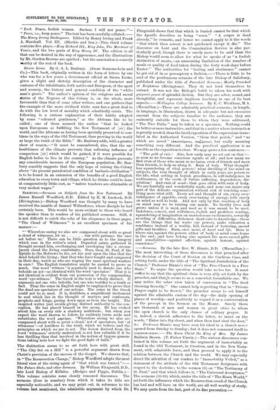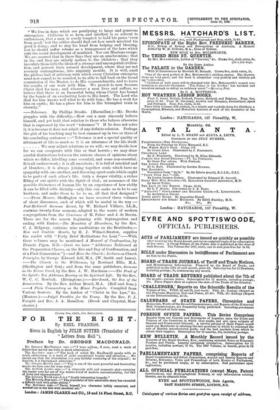Sermons. By the late Rev. W. Binnie, D.D. (Macmillan.)— The
most interesting of these discourses is that preached after the decision of the Court of Session on the Cardross Case, and setting forth, under the title of "The Spiritual Jurisdiction of the Church," Professor Binnie's view of "The Free Church in a Free State." To argue the question would take us too far. It must suffice to say that the spiritual claim is very ably set forth by the preacher, and that;it seems to us a somewhat formidable one. We may notice the sober view taken of conversion in "The Seed Growing Secretly." One cannot help regretting that in "Private Prayer ought to be Secret," the preacher seems to set himself against the admirable custom of the day—the daily opening of places of worship—and positively to regard it as a contravention of the precept in the Sermon on the Mount. Surely there are thousands of men and women in great cities to whom the open church is the only chance of solitary prayer. It is, indeed, a slavish adherence to the letter, to insist on the words, "Enter into thy closet, and when thou hast shut the door," &c. Professor Binnie may have seen his ideal in a church never opened from Sunday to Sunday; but it does not commend itself to common-sense.—The Risen Christ the King of Men. By James Baldwin Brown. (T. Fisher Unwin.)—The sixteen discourses con- tained in this volume set forth the argument of immortality as found in the Old Testament, in Creation, and in the New Testa- ment, with admirable force, and then proceed to apply it to the relation between the Church and the world. We may especially direct the attention of our readers to "Immortality Veiled," as a statement of the attitude of the Old Testament Scriptures with respect to the doctrine ; to the sermon (6) on "The Testimony of St. Paul," and that which follows it, "The Universal Acceptance." The sermons (10-16) which, under the title of "The Risen World," set forth the influences which the Resurrection creed of the Church has had and will have on the world, are all well worthy of study.
We may quote from the last, part of its fine peroration "We live in days which are paralysing to large and generous enterprises. Criticism is so keen, and intellect is so solvent to enthusiasm, that a man is sorely tempted to hold his peace even from good,' lest the critics should find out how much mischief his good is dein.– and to stay his hand from helping and blessing, lest he should suffer rebuke as a transgressor of the laws which rule the social development of mankind. Nor can Missions escape. We are assured that in these 'days they are an anachronism; that in the end they are utterly useless to the idolaters ; that they inoculate them with the ideas of a strange and uncongenial civilisa- tion, and pervert their natural development, where they are not serenely contemptuous, into ungainly moulds. It is well, amid the pitiless hail of criticism with which every Christian enterprise must now expect to be assailed, to be able to fall back on the broad commission of the Master, to do His commandments, and to leave the results of our work with Him. We preach to men because Christ died for men ; and wherever a man lives and suffers, we believe that there is an Immortal being whom Christ has bound by the bands of an everlasting Love to His heart. The Lord who died for him knows well what to do with him ; He has a work for him on earth ; He has a place for him in His triumphal train in eternity."



















































 Previous page
Previous page